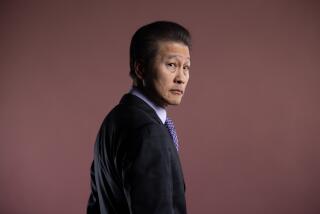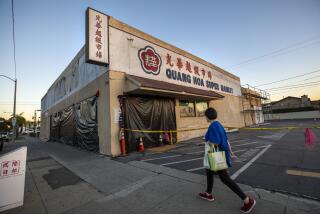Small Size Gives the Region’s Banks an Advantage in China Commerce
- Share via
Roger Liang, chairman of a Fremont, Calif., electronics manufacturer called Bizlink Technology, has done his share of business with Wells Fargo & Co. and Union Bank of California. But when he tried to get those institutions to help him make inroads into China, he says, he ran right into a great wall.
So to meet his needs there, Liang has turned elsewhere: Los Angeles-based Far East National Bank.
“We need to do local business directly in China, and we have to get banking in China for financing and foreign exchange,” Liang explains. It is “very helpful,” he adds, to work with Far East National on the ground overseas.
Trade between California and China totals tens of billions of dollars a year, with hundreds of companies in the Golden State handling the design, marketing and distribution of products going to and from the Asian nation. Yet small businesses trying to find a bank to handle their financial needs in Shanghai or Beijing often have wound up frustrated.
Slowly, that situation is changing, thanks to Far East National and a couple of other banks that see the tremendous promise that China holds for them and their customers.
Far East National, a subsidiary of Bank SinoPac of Taiwan, has just achieved a breakthrough by taking over the management in Shanghai of First
Sino Bank. Through First Sino, it can offer loans and take deposits in dollars or Chinese yuan for U.S. companies.
Meanwhile, East West Bancorp Inc. of San Marino recently opened a “representative,” or business development, office in Beijing to serve as a point of contact for its California customers.
These two small lenders join Cathay Bancorp Inc. of Los Angeles, which for five years has maintained a representative office in Shanghai.
By comparison, most bigger banks have been reluctant to get into China. There are exceptions -- most notably Citigroup Inc., which operates four branches there. Bank of America Corp., which has a branch in Hong Kong, also is active in the Chinese market.
Yet these behemoths don’t typically cater to smaller companies. And this is where the three Southern California banks -- with less than $8 billion in assets among them -- have a “size” advantage over their bigger counterparts: They are in a much better position to work closely with the entrepreneurial firms that are making some of the greatest strides in China.
“We all benefit from the entree those banks have in China,” says Don M. Griffith, a veteran Los Angeles banker who is chairman and principal owner of First Coastal Bank in El Segundo and Manhattan Beach. Because the banks are small, he notes, there is “easier access” to referrals and relationships for the great majority of companies here.
Far East National was founded in 1974 in L.A.’s Chinatown by Henry Hwang, an immigrant from Shanghai who soon began seeking business from the non-Chinese community (and became embroiled in controversy when he put then-Mayor Tom Bradley on his payroll as an advisor). Hwang also looked early to China, opening a representative office in Beijing in 1993.
In 1997, Bank SinoPac bought Far East National for $90 million, forging a nexus of businesses in Taiwan and California. More recently, Bank SinoPac investors were able to acquire First Sino Bank, and they have poured $100 million in capital into it. But because the Chinese authorities won’t allow a Taiwanese institution to operate a bank in China, SinoPac designated its U.S. subsidiary, Far East National, to run First Sino -- a quirk of geopolitics that is good news for California business.
For U.S. companies other than those with the heft of a General Motors Corp., “it is difficult ... to get help in China,” says Far East’s president, Robert Oehler, a former Citibank executive who took over management in Los Angeles after the ’97 purchase.
“Chinese banks don’t know the U.S. company, so they are fearful of lending. And U.S. companies don’t know the Chinese financial system.”
Far East National, backed by Bank SinoPac’s $16 billion in assets, aims to serve as the bridge.
Its rivals also believe they have plenty to offer. Dominic Ng, chairman of East West Bank, says his institution will provide U.S. companies “very good connections” through its new Beijing office and a correspondent banking relationship with the Industrial & Commercial Bank of China.
In a bit of one-upmanship, Ng lured Rose Lee, the longtime head of Far East’s Beijing office, to work in his bank’s operation in China’s capital. And he had an assist in doing so from Henry Hwang’s new company, Rock Asia Capital Group, a Los Angeles-based consulting and investment firm.
Under terms dictated by the World Trade Organization, China must open its financial markets to more foreign banks in 2006. In turn, competition could flood in. But even if it does, the small banks figure that there still will be more than enough commerce to go around.
“China has 1.3 billion people,” points out Dunson Cheng, chairman of Cathay Bank. “You don’t have to do business with them all. You only need a little niche.”
*
James Flanigan can be reached at jim.flanigan @latimes.com.
More to Read
Inside the business of entertainment
The Wide Shot brings you news, analysis and insights on everything from streaming wars to production — and what it all means for the future.
You may occasionally receive promotional content from the Los Angeles Times.










